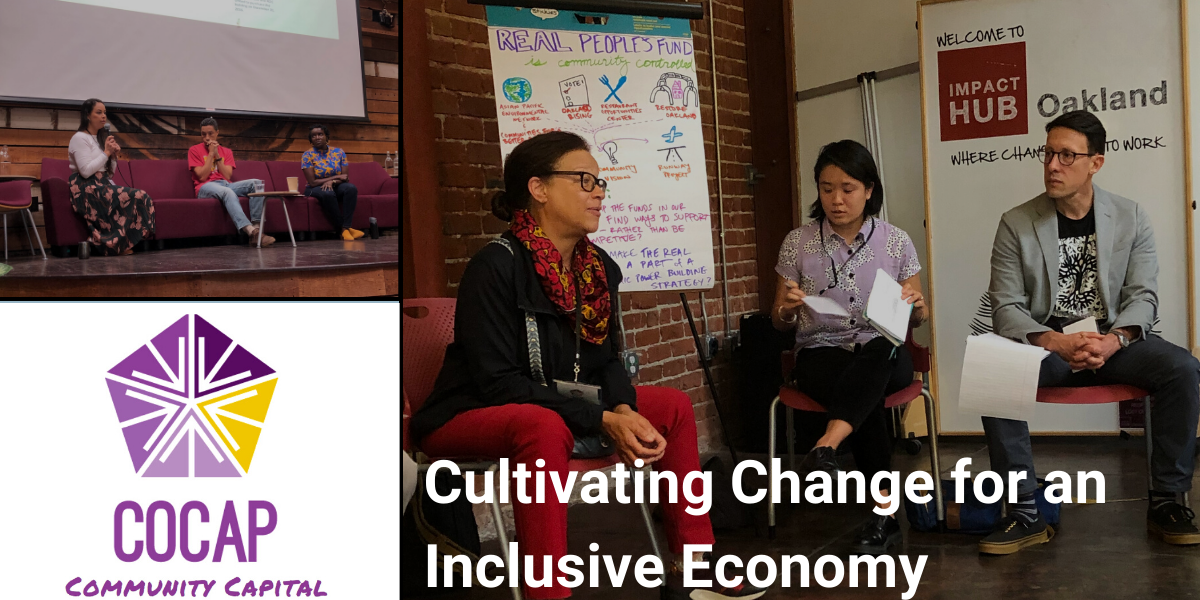The Community Capital Conference, better known as COCAP, took place this year at Impact Hub Oakland and the Intersection for the Arts, both community-based coworking facilities. In its sixth year, the theme for 2019 was Nourishing Community Wealth, and included sessions on Opportunity Zones, rural ecosystems, cooperatives and democratic ownership for land and housing, indigenous knowledge of community wealth building, and more. COCAP serves as a gathering space where people can discuss and strategize on how to cultivate change that will facilitate a transition to a just and inclusive economy.
Entrepreneurs, activists, funders, and investors spent three days together discussing strategies for building community-driven initiatives and enterprises that center racial equity, local economic development, and respect for our natural resources. A new feature at COCAP this year included a number of interactive workshops with local institutions and community members. Several of our staff participated in these Deep Dive workshops with partner organizations Restore Oakland, Ella Baker Center, East Bay Community Foundation, The Runway Project, Solidago Foundation, and Cutting Edge Capital. The conversations focused on Restore Oakland and the REAL People’s Fund; two Bay Area-based initiatives for building community and economic power.
Along with presenting, staff members also had the opportunity to listen and learn from the community about how financial institutions can be a better partner in creating a just and inclusive economy.
Below are a few reflections and questions from this year’s conference that are relevant for the financial sector as a whole, and particularly for organizations that are working to build a just economy.
RISK IS MAINTAINING THE STATUS QUO
A just economy is dynamic and responsive to the community’s needs. If the CDFI industry employs traditional financial measures and definitions of risk, credit worthiness, and sustainability, then socioeconomic harms that have been inflicted upon communities can be replicated or worsened. It is important for financial institutions to re-define risk to ensure capital is not only accessible, but also that resources are redistributed with an equity framework that offers healing and restoration. Certainly to continue on the path of an extractive economy that depends on fossil fuel, labor exploitation, and market rate housing will continue the status quo of a racially exclusionary and harmful economy.
MORE THAN ACCESS TO CAPITAL
A just economy closes the racial wealth divide. This inevitably includes a shift in power that must center historically disinvested communities in decision-making positions for community development and capital funds. Drawing from indigenous matriarchal wisdom, we can learn how to center our economies in equity where wealth building is a service to the community rather than for individual gain. Communities know what they need to thrive, but often face many barriers to influencing development projects. CDFIs can support local, mission-driven organizations and businesses by providing financing along with other services that strengthen the ability for those organizations and entrepreneurs to successfully take in and utilize capital.
COMMUNITY CENTERED SPACES ARE KEY
A just economy recognizes space as sacred and acknowledges that we live on indigenous lands, where many first peoples struggle for recognition and rights as a sovereign people. This is a reality that must be front and center when discussing community-owned land and space among historically marginalized communities. What are the actual structures and systems for communities to access and have decision making power over how space is used? How do we de-commodify space and use it to cultivate connections and relationships rather than to generate profit? Many organizations and grassroots initiatives are movement building to influence policy and systems change for access to housing and land. These organizing efforts can inform the CDFI industry’s practices around real estate acquisition for community development projects.
In California we have ample opportunities to develop models for inclusive and just economies. California has one of the largest economies in the world, and at the same time many of our communities are experiencing rampant displacement and homelessness, rising housing costs, and drastically widening racial wealth and income gaps. People of color are the largest population demographic in the state, and are starting and running the majority of California’s small businesses. Yet, more than 50% of people of color owned businesses are denied access to capital.
“While it may seem like a long and difficult path to change policies, institutions, and paradigms, we know this work is already happening. COCAP is a testament to the positive changes that communities are creating. Both through desire and out of necessity, communities are implementing solutions that are healing, generative, and collaborative.”
– Kelly Ehrenfeld, Senior Real Estate Consultant at Community Vision
Community Vision was honored to participate in this year’s gathering as a trusted partner in community and economic development. It is important for us to be in community-driven spaces like COCAP because we can directly listen to and learn from the entrepreneurs who are creating just economies. This allows us, as a financial institution, to better serve as a partner in dismantling structural inequities that uphold and normalize power imbalances and that preclude community self-determination and resilience.





